
A Few Quick Ones is a collection of ten short stories by P. G. Wodehouse. It was first published in the United States on 13 April 1959 by Simon & Schuster, New York, and in the United Kingdom on 26 June 1959 by Herbert Jenkins, London. The first US edition dust jacket was designed by Paul Bacon. The book's title comes from the informal phrase "a quick one", which is British slang for an alcoholic drink consumed quickly.

Raincoat is a 2004 Indian drama film directed by Rituparno Ghosh, and starring Ajay Devgn and Aishwarya Rai. It tells the story of two lovers, separated by destiny, who meet again one day. This encounter allows each to realize the truth about the lives they are living. It is an adaptation of two short stories- Protihingsha and The Gift of the Magi.

The Informers is a collection of short stories, linked by the same continuity, written by American author Bret Easton Ellis. The collection was first published as a whole in 1994. Chapters 6 and 7, "Water from the Sun" and "Discovering Japan", were published separately in the UK by Picador in 2007. The stories display attributes similar to Ellis's novels Less than Zero, The Rules of Attraction, and, to a lesser extent, American Psycho. Like many of Ellis's novels, the stories are set predominantly in California.

Parker Pyne Investigates is a short story collection written by Agatha Christie and first published in the UK by William Collins and Sons in November 1934. Along with The Listerdale Mystery, this collection did not appear under the usual imprint of the Collins Crime Club but instead appeared as part of the Collins Mystery series. It appeared in the US later in the same year published by Dodd, Mead and Company under the title Mr. Parker Pyne, Detective. The UK edition retailed at seven shillings and sixpence (7/6) and the US edition at $2.00.

Winner Take Nothing is a 1933 collection of short stories by Ernest Hemingway. Hemingway's third and final collection of stories, it was published four years after A Farewell to Arms (1929), and a year after his non-fiction book about bullfighting, Death in the Afternoon (1932).

Cosette is a fictional character in the 1862 novel Les Misérables by Victor Hugo and in the many adaptations of the story for stage, film, and television. Her birth name, Euphrasie, is only mentioned briefly. As the orphaned child of an unmarried mother deserted by her father, Hugo never gives her a surname. In the course of the novel, she is mistakenly identified as Ursule, Lark, or Mademoiselle Lanoire.

Will You Please Be Quiet, Please? (1976) was the first major-press short-story collection by American writer Raymond Carver. Described by contemporary critics as a foundational text of minimalist fiction, its stories offered an incisive and influential telling of disenchantment in the mid-century American working class.
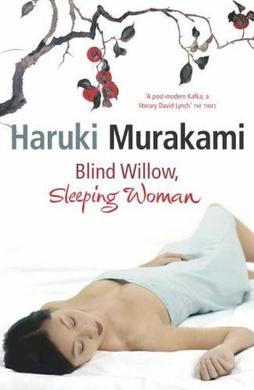
Blind Willow, Sleeping Woman is a collection of 24 short stories by Japanese author Haruki Murakami.
Isabella Toscano is a fictional character from the NBC soap opera Days of Our Lives. The character first appeared on a recurring basis on October 16, 1989, and was portrayed by actress Staci Greason. Greason was put on contract in December 1989. Greason left the show in October 1992, after Isabella died from pancreatic cancer. Greason reappeared later on as Isabella's ghost in 1995, 2000, 2002, 2003, and most recently in November 2010.
"Cathedral" is a short story written by American writer and poet Raymond Carver. It was the first story written after finishing What We Talk About When We Talk About Love. "Cathedral" was first published in the September 1981 issue of The Atlantic Monthly. It was later collected in a short story collection of the same name in 1983.
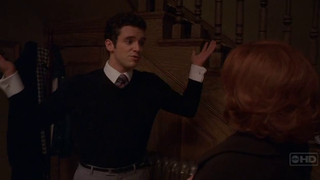
"Don't Ask, Don't Tell" is the 18th episode of the dramedy series Ugly Betty, which aired in the US on March 22, 2007. The episode was co-written by Marco Pennette, Veronica Becker and Sarah Kucserka and directed by Tricia Brock. The episode's title refers to the United States' "Don't ask, don't tell" military policy.

What We Talk About When We Talk About Love is a 1981 collection of short stories by American writer Raymond Carver, as well as the title of one of the stories in the collection. Considered by many one of American literature's most ambitious short-story collections, it was this collection that turned Raymond Carver into a household name in the publishing industry.
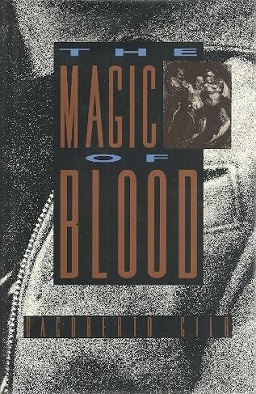
The Magic of Blood is a short story collection by Dagoberto Gilb. It received the 1994 Hemingway Foundation/PEN Award and the 1993 Whiting Writers' Award. The collection was released to rave reviews by several reputable critics, as well as authors, for its brutal realism and genuine portrayal of the marginalized masses. His book contains 29 stories separated into three distinct sections, which epitomize the perspective of the working classes and Chicano culture. Gilb's prose are simplistic in nature and his writing belongs to a proletariat genre, which explores the existence of labor, love, families, friends and the immigrant community in America.
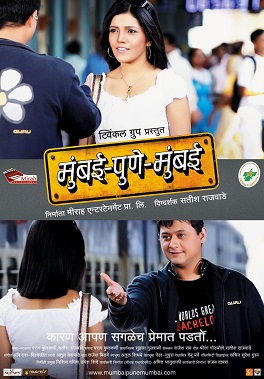
Mumbai-Pune-Mumbai is a 2010 Indian Marathi-language romance film directed and co-written by Satish Rajwade. The film was released in Maharashtra on 11 June 2010 and stars Swapnil Joshi and Mukta Barve as the only two unnamed characters from different cities of Pune and Mumbai, respectively, and the film is about how their competitive spirits bring them together. The film was critically and commercially successful at the box office and is the first installment of the Mumbai-Pune-Mumbai film series before its two sequels titled Mumbai-Pune-Mumbai 2 (2015) and Mumbai-Pune-Mumbai 3 (2018). The was remade in Hindi in 2014 as Mumbai Delhi Mumbai, in Kannada as Pyarge Aagbittaite, in Telugu as Made in Vizag and in Punjabi as Chandigarh Amritsar Chandigarh. In Gujarati, it is remade as "Taari Saathe".
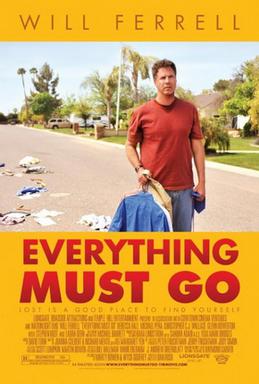
Everything Must Go is a 2010 American comedy-drama film directed by Dan Rush and starring Will Ferrell. The film was based on Raymond Carver's 1978 short story "Why Don't You Dance?" and was released in theaters on May 13, 2011.
"Rhodes to Perdition" is the ninth episode of season 5 on the show, Gossip Girl. The episode was directed by Andrew McCarthy and written by Natalie Krinsky. It was aired on November 28, 2011 on the CW.
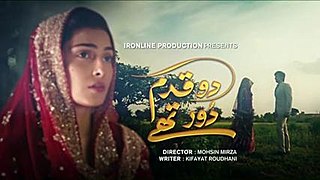
Do Qadam Door Thay is an Urdu-language Pakistani social drama serial directed by Mohsin Mirza, Co Director Kashif Ahmed Butt, written by Kifayat Rodani and produced by Ironline Productions. The drama was first aired 3 February 2014 on Geo TV starring Sami Khan, Aiza Khan, Sana Khan and Ali Khan as lead roles. The drama was superhit from its first episode. It has gained huge appreciation form the India's audience.

The Refugees is a 2017 short story collection by Viet Thanh Nguyen. It is Nguyen's first published short story collection and his first book after winning the Pulitzer Prize for The Sympathizer. The eight-story collection, set in different locations in California and Vietnam, earned favorable reviews from critics, particularly for offering insight into the lives of migrants like those the book depicts.

Balika Vadhu 2 is an Indian dramatic television series that aired on Colors TV from 9 August 2021 to 25 February 2022 and on Voot from 28 February 2022 to 29 March 2022. It is a reboot of the long-running series Balika Vadhu. Produced by Sphere Origins, its cast includes Shivangi Joshi, Randeep Rai, and Samridh Bawa.
















